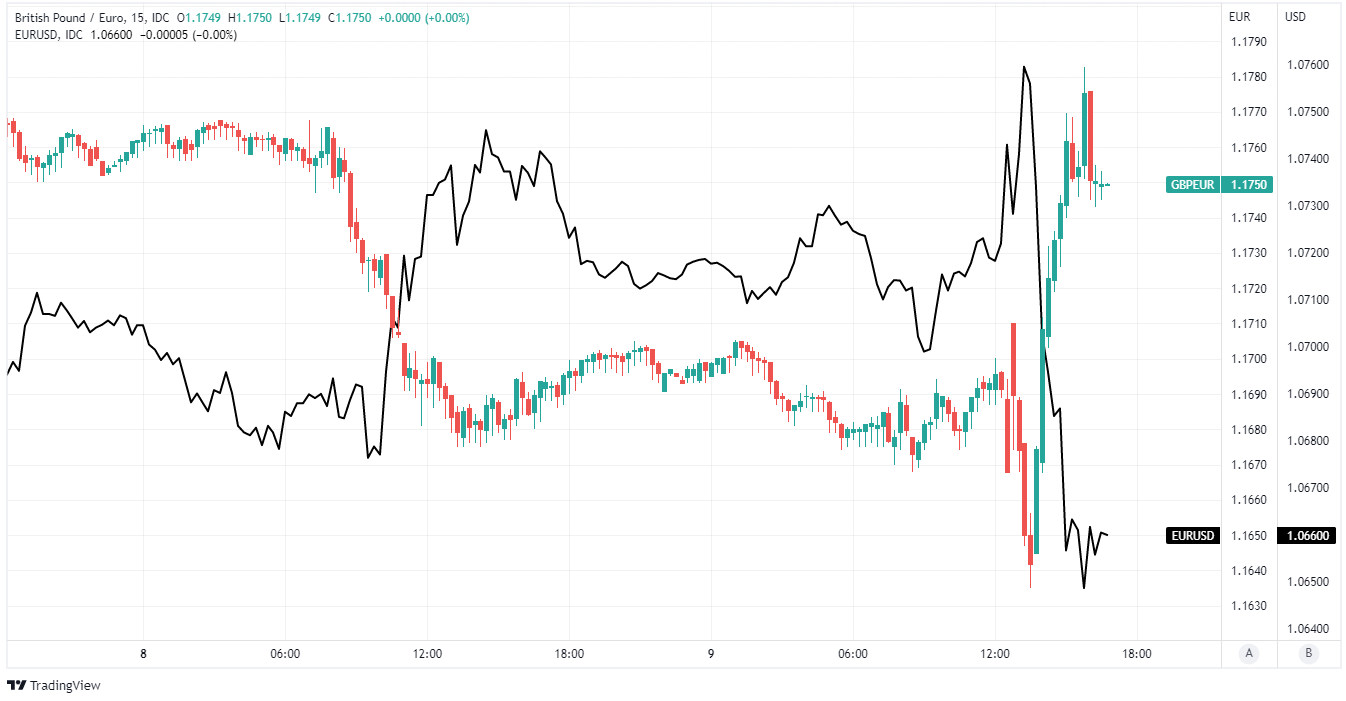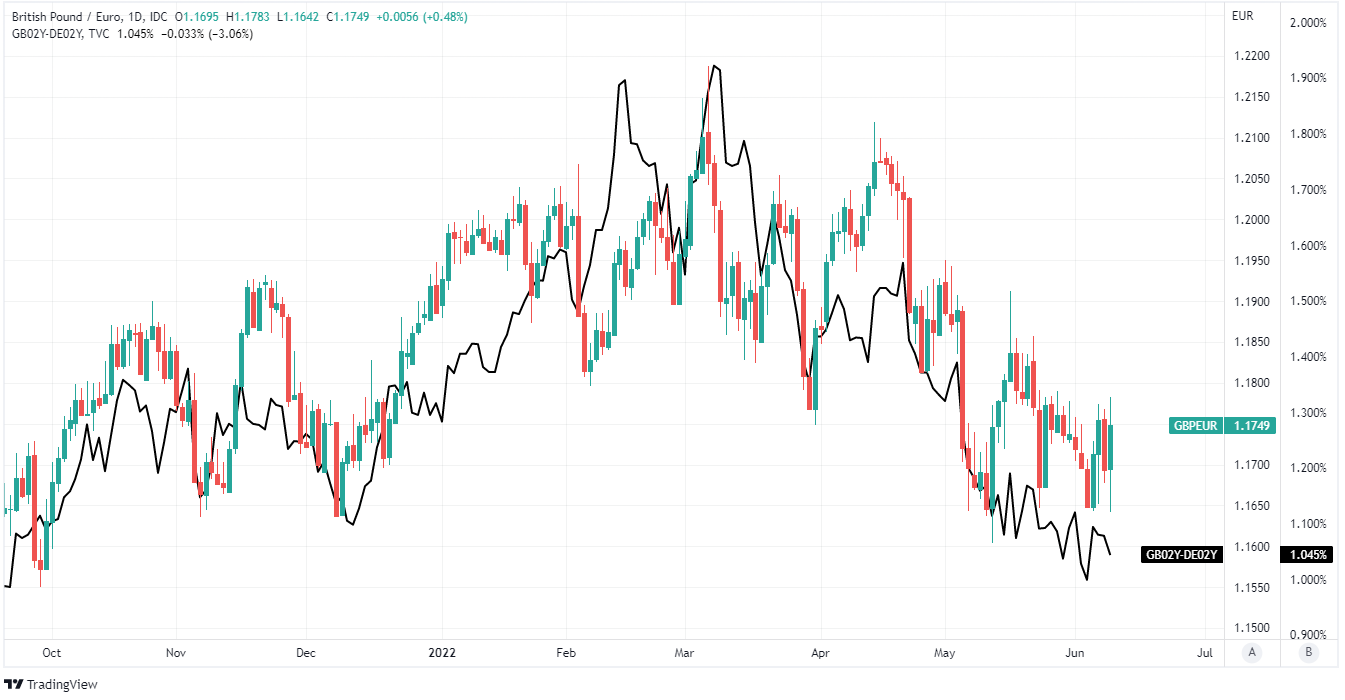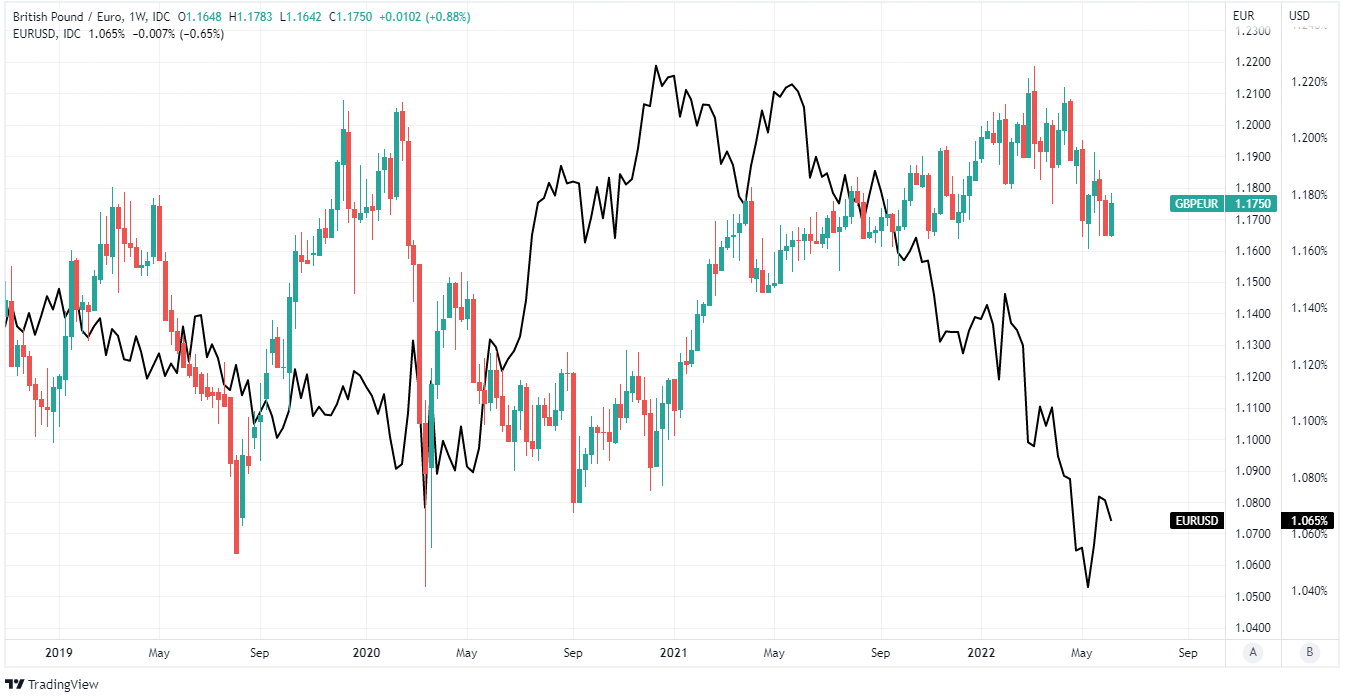GBP/EUR Rate in Volatile Trade after Landmark ECB Policy Decision
- Written by: James Skinner
- ECB announces very hawkish inflation forecast upgrades
- Announces imminent end to quantitative easing in Europe
- Signals end of negative interest rate era is drawing nearer
- Unveils bazooka of backstop for 'periphery' bond markets
- Guarding against "fragmentation" during interest rate liftoff

© European Central Bank, reproduced under CC licensing
The Pound to Euro exchange rate rallied in what was highly volatile trade for the single currency on Thursday as the market digested a landmark European Central Bank (ECB) policy decision warning that an end to the era of negative interest rates in Europe is imminent.
Europe's single currency whip-sawed in the hours after Thursday's decision, leading to volatile trade in Sterling too as financial markets contemplated a hawkish policy announcement that was later expanded with the addition of important context and caveats.
President Christine Lagarde made clear an intention to retain optionality in forthcoming interest rate decisions while indicating a preference for a gradual pace of increases in the months and quarters ahead.
Some of the remarks could be interpreted as suggesting that financial market expectations have recently moved too far ahead for a central bank that assigns an appreciably high value to "data dependency, gradualism and flexibility in the conduct of monetary policy."
They came after the ECB effectively preannounced a decision to lift all of its interest rates by 0.25% in July and gave carefully worded guidance that created room to proceed in increments of 0.50% or larger soon after.
"In May inflation again rose significantly, mainly because of surging energy and food prices, including due to the impact of the war. But inflation pressures have broadened and intensified, with prices for many goods and services increasing strongly," the ECB said on Thursday.
 Above: Pound to Euro rate shown at 15-minute intervals alongside EUR/USD. Click image for closer inspection.
Above: Pound to Euro rate shown at 15-minute intervals alongside EUR/USD. Click image for closer inspection.
Compare Currency Exchange Rates
Find out how much you could save on your international transfer
Estimated saving compared to high street banks:
£2,500.00
Free • No obligation • Takes 2 minutes
"Headline inflation at the end of the projection horizon is projected to be slightly above the Governing Council’s target. Inflation excluding energy and food is projected to average 3.3% in 2022, 2.8% in 2023 and 2.3% in 2024," it added.
Most notably, the latest forecasts suggested that inflation will sit at 2.3% in 2024 even after volatile and mostly imported energy and food costs are excluded from the goods and services basket under the microscope, leaving the better measure of domestically-generated inflation well above the ECB's 2% target.
"Accordingly, and in line with the Governing Council’s policy sequencing, the Governing Council intends to raise the key ECB interest rates by 25 basis points at its July monetary policy meeting," the ECB said in its statement.
"Looking further ahead, the Governing Council expects to raise the key ECB interest rates again in September. The calibration of this rate increase will depend on the updated medium-term inflation outlook. If the medium-term inflation outlook persists or deteriorates, a larger increment will be appropriate at the September meeting," the bank later warned.
This was followed by an uplift to market-implied measures of expectations for interest rates, which have since come to suggest that investors and traders are anticipating a total 1.4% increase in European interest rates by year-end.
"The Governing Council decided to end net asset purchases under its asset purchase programme (APP) as of 1 July 2022," the ECB also said.
 Above: Pound to Euro rate shown at daily intervals with spread or gap between 02-year GB and German government bond yields and alongside EUR/USD. Click image for closer inspection.
Above: Pound to Euro rate shown at daily intervals with spread or gap between 02-year GB and German government bond yields and alongside EUR/USD. Click image for closer inspection.
Compare Currency Exchange Rates
Find out how much you could save on your international transfer
Estimated saving compared to high street banks:
£2,500.00
Free • No obligation • Takes 2 minutes
Elsewhere in the decision the ECB conformed with market expectations when announcing that its last remaining quantitative easing programme will be ended promptly as of July 01, which is a necessary precondition for the preannounced plan to begin lifting interest rates in July.
Most importantly for the Euro, the ECB said it would turn its mammoth €1.85 trillion Pandemic Emergency Purchase Programme bond portfolio into a form of backstop that would act as insurance policy that is intended to mitigate financial market concerns about "fragmentation risk" as its interest rates rise.
"In the event of renewed market fragmentation related to the pandemic, PEPP reinvestments can be adjusted flexibly across time, asset classes and jurisdictions at any time," the ECB said in its statement.
The ECB receives monies from governments each time a bond on its balance sheet reaches maturity, and the new mechanism will allow the ECB to reinvest these monies wherever and whenever it's necessary for ensuring a uniform application of the bank's monetary policy across the bloc.
The backstop mechanism is potentially bullish for the Euro because it would eliminate concerns about stability in Southern European bond markets like those of Italy, Spain and Greece, while also potentially enabling the ECB to lift its interest rates higher than it might have otherwise.
 Above: Pound to Euro rate shown at weekly intervals with EUR/USD. Click image for closer inspection.
Above: Pound to Euro rate shown at weekly intervals with EUR/USD. Click image for closer inspection.
Compare Currency Exchange Rates
Find out how much you could save on your international transfer
Estimated saving compared to high street banks:
£2,500.00
Free • No obligation • Takes 2 minutes
The mechanism is necessary because the ECB presides over a monetary union of 19 countries, some of whom are perilously indebted and some of whom aren't, which poses a unique challenge to the bank as it recalibrates monetary policy for an era in which low inflation can no longer be taken for granted.
These differing degrees of perceived creditworthiness among Euro area members can sometimes lead the market to treat their respective government bond markets differently and in ways that can complicate or potentially even prevent a uniform application of the ECB's monetary policy.
Differing perceptions of creditworthiness and their varying impacts on government financing costs across the Euro area have in the past threatened some countries’ access to debt markets and taken a toll on the single currency, hence why such risks are already prominent in mind at the ECB.
"Beyond September, based on its current assessment, the Governing Council anticipates that a gradual but sustained path of further increases in interest rates will be appropriate. In line with the Governing Council’s commitment to its 2% medium-term target, the pace at which the Governing Council adjusts its monetary policy will depend on the incoming data and how it assesses inflation to develop in the medium term," the ECB did also say on Thursday.
"In the meantime, the Governing Council decided to leave the interest rate on the main refinancing operations and the interest rates on the marginal lending facility and the deposit facility unchanged at 0.00%, 0.25% and -0.50% respectively," it had said previously.
The full text of the ECB's announcement can be accessed here.




